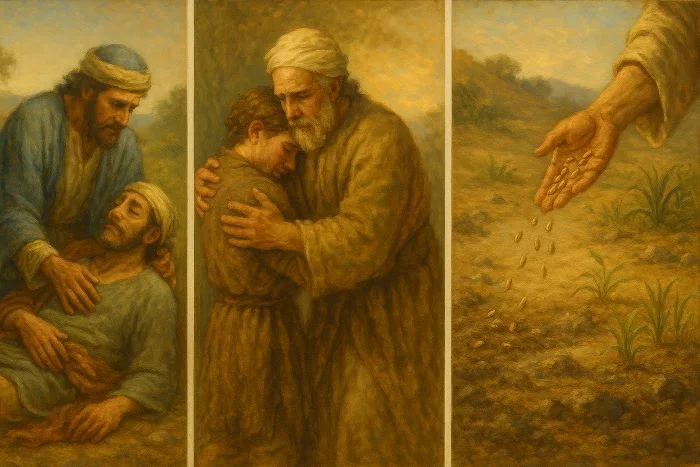
There’s something unforgettable about a good story—especially one that gets to the heart of who we are and how we live.
That’s exactly what Jesus did with His parables. These weren’t just clever illustrations or moral fables. They were truth-packed stories designed to draw listeners in and leave them thinking long after the crowds had dispersed.
As a wife, a mom, and someone who’s walked with Jesus for years, I find myself continually returning to His parables.
They’re rich, relatable, and remarkably relevant—even two thousand years later. Whether you’ve read them dozens of times or are just beginning to explore them, the parables of Jesus still speak, still challenge, and still change lives.
Let’s dive in and rediscover their meaning for us today.
Why Jesus Taught in Parables
In a time when most religious instruction was heavy and hard to understand, Jesus chose a different path. He met people right where they were—through stories.
Parables are like windows into the Kingdom of God. They use everyday experiences—planting seeds, baking bread, losing coins—to open our eyes to deeper truths. Jesus didn’t teach in parables because His message was too complicated, but because it was too important to miss.
His stories stirred curiosity and left room for reflection. They invited people to think, to wrestle, and ultimately, to respond.
Back then, storytelling was one of the most powerful tools for communication. It wasn’t just entertainment—it was how people made sense of the world.
Jesus took that cultural norm and used it to turn hearts toward heaven. His parables crossed social and cultural boundaries, reaching people from all walks of life with timeless truths that still matter today.
Understanding the Message: Key Parables and Their Meaning

Some of Jesus’ parables have become so well known that we forget how revolutionary they were. Let’s take a fresh look at a few and unpack their original intent—and how they still resonate with us.
1️⃣ The Good Samaritan (Luke 10:25–37)
This parable isn’t just about being kind. It’s a radical call to love beyond prejudice. Jesus turned cultural expectations upside down by making the “enemy” of the story—the Samaritan—the hero. At its core, this story reminds us that true neighborly love knows no boundaries.
Today, in a world that often divides along racial, political, or economic lines, the message of the Good Samaritan challenges us: Are we willing to love people who are different from us?
2️⃣ The Prodigal Son (Luke 15:11–32)
One of the most beloved parables, the story of the Prodigal Son paints a powerful picture of grace and restoration. A young man squanders everything, only to be welcomed back with open arms by his father.
For the original audience, this was shocking—unheard of, even. Yet, it mirrors God’s heart toward us. It speaks to anyone who has ever wandered far from God, whispering hope: You can always come home.
3️⃣ The Parable of the Sower (Matthew 13:1–23)
In this story, Jesus describes a farmer sowing seed on different types of soil. The seed is the Word of God, and the soil is the condition of our hearts. Some people hear the message but don’t receive it. Others receive it with joy but fall away. Only the good soil bears fruit.
This parable is a mirror—inviting us to evaluate our own hearts. Are we open and receptive to God’s truth, or are distractions and worries choking it out?
Each of these parables addresses real human struggles—pride, judgment, rejection, forgiveness—and they do it in a way that still speaks volumes today.
The Timeless Relevance of Jesus’ Parables
So, what makes these ancient stories so powerful in the modern world? They can speak to the heart.
We live in a culture overwhelmed by noise—quick answers, hot takes, and endless opinions. But Jesus’ parables invite us to slow down. To listen. To reflect. They don’t just tell us what to think; they challenge us to consider how we’re living.
In today’s divided and fast-paced world, the Good Samaritan calls us to radical compassion. The Prodigal Son reminds us that forgiveness and reconciliation are still possible, even in messy relationships. And the Sower nudges us to be intentional about how we respond to truth in a culture that’s often allergic to it.
These stories offer more than lessons. They offer a lens through which we can view our lives, relationships, and faith.
? Want to dig deeper into the parables of Jesus?
Tell Me the Stories of Jesus: The Explosive Power of the Parables by R. Albert Mohler Jr. will help you unlock the full power of Jesus’ parables!
Affiliate Disclaimer
This post contains affiliate links. If you click on one of the links and make a purchase, I may receive a small commission at no extra cost to you. I only recommend products I truly believe in and think will be beneficial to my readers. Thank you for supporting Biblical Christianity!
Tell Me the Stories of Jesus: The Explosive Power of Jesus’ Parables
By R. Albert Mohler Jr.
Jesus’ parables were more than stories—they were bold, truth-packed teachings that challenged the hearts of His listeners. In this insightful book, Dr. R. Albert Mohler Jr. brings the parables to life, unpacking their original cultural and spiritual significance so you can hear them as Jesus’ audience did. A great resource for deepening your understanding of God’s kingdom and the power of His Word.
Living the Parables: From Story to Practice

One of the most powerful ways we can engage with the parables of Jesus is by living them out.
This doesn’t mean we need to become Bible scholars or have every verse memorized. It simply means being willing to let these truths shape our choices and relationships.
Here are a few ways to make the parables part of your everyday walk:
☑ Reflect regularly
Make space to revisit the parables in your personal Bible study. Ask God to show you how they apply to your life right now.
☑ Discuss them in community
Whether it’s with your small group, a friend, or your family around the dinner table, talk about these stories. Listen to how others interpret them—you might be surprised by the insights that surface.
☑ Act on the lessons
Don’t just admire the Samaritan—be one. Don’t just read about forgiveness—offer it. The beauty of Jesus’ parables is that they’re not just for thinking; they’re for doing.
Over the years, I’ve heard countless testimonies of people who’ve been deeply changed by these parables. Stories of reconciliation in families. Acts of kindness that bridged cultural gaps. Personal awakenings stirred by a single line from Scripture. The parables are alive—and they still transform.
Final Thoughts: Letting the Parables Shape Our Faith
At the heart of it all, Jesus’ parables aren’t just stories—they’re invitations. Invitations to listen, to learn, to lean into God’s heart. They aren’t just about characters from long ago, but about us—our fears, our failures, our hopes, and our choices.
If you’ve ever struggled with understanding the Bible or wondered how to connect ancient teachings with real life, start with the parables. Let them speak to your heart, shape your faith, and draw you closer to the One who told them with love.
No matter where you are on your journey, the parables remind us that there’s room to grow—and grace to grow in. May we continue to hear their message, live their truths, and share their light with a world that needs it now more than ever.
Looking to go deeper?
Try reading one parable a week and journaling about how it applies to your current season. Invite your children or spouse into the conversation too—these stories were made to be shared.
Let’s keep learning and growing together, friend.


Afternoon, I am so thankful I have this computer, Provides information I was looking for: As I want to know my Lord and Saviour, wanting to know him deeper and understand.
I am blessed and so thankful that I have him in my life.
GOD BLESS ! 😊
I was always interested in how Jesus uses these parables in his everyday life.
Thank you for reading, Daphne. I’m glad you found the information you were looking for in this post.
Continue to seek the Lord and grow in your knowledge of Him.
Blessings to you!
This was such a refreshing read!
I’ve heard the parables of Jesus many times, but I love how this article brought out not just their depth but also their relevance for today.
As a parent and believer, I’m constantly amazed at how these simple stories still speak into my daily life. The reminder that Jesus used storytelling not to complicate things but to make deep truths accessible really resonated with me.
The Good Samaritan’s challenge to love beyond bias, the Prodigal Son’s message of overwhelming grace, and the Sower’s call to examine our hearts—each one made me pause and reflect. In a world full of noise and division, these stories feel like gentle but firm nudges back to what truly matters.
Thank you for unpacking them so beautifully!
Hi Kavitha! ?
Thank you so much for your kind and thoughtful words—they truly blessed me! I’m so glad the post resonated with you.
It’s amazing how the parables, though spoken thousands of years ago, still speak so powerfully into our lives today—especially as parents and believers navigating a noisy, often divided world.
You expressed it so beautifully: these stories are gentle but firm nudges back to the heart of God’s truth. I’m grateful you found meaning in the reminders of grace, love beyond bias, and the call to examine our hearts. Jesus really did make deep truths accessible through simple storytelling—and what a gift that is to all of us.
Thank you again for taking the time to share. God bless you and your family on your journey of faith! ?
With gratitude,
Alice
This is an interesting one, the parables of Jesus.
He was telling His truths in a simple way that the average common labourer of the time would instantly identify with and understand.
However, look at what Jesus said in Matthew 13, when the disciples asked Him precisely this question. He’s not trying to make it easy. He’s forcing them to actually think about what He’s saying if they want to catch His meaning. He’s deliberately introducing an element of challenge so that only those who actually want to understand what He’s saying will get it.
Hi Leahrae,
Thank you so much for sharing your thoughtful reflection!
You’re absolutely right—Jesus’ parables weren’t just simple stories for the sake of easy understanding. As you pointed out, in Matthew 13, Jesus Himself explained that He used parables not only to illustrate truth but also to reveal the hearts of His listeners.
It’s fascinating how the parables served a dual purpose: they could enlighten or conceal depending on the listener’s openness to receive truth.
Jesus said in Matthew 13:13, “This is why I speak to them in parables: Though seeing, they do not see; though hearing, they do not hear or understand.” He was indeed inviting people to lean in closer—to seek, ask, and knock (Matthew 7:7)—so they could truly grasp the spiritual meaning behind His words.
Your point beautifully highlights that following Jesus often requires us to go deeper than surface-level understanding.
Thank you again for your insight, and may God continue to bless you as you study His Word!
Blessings!